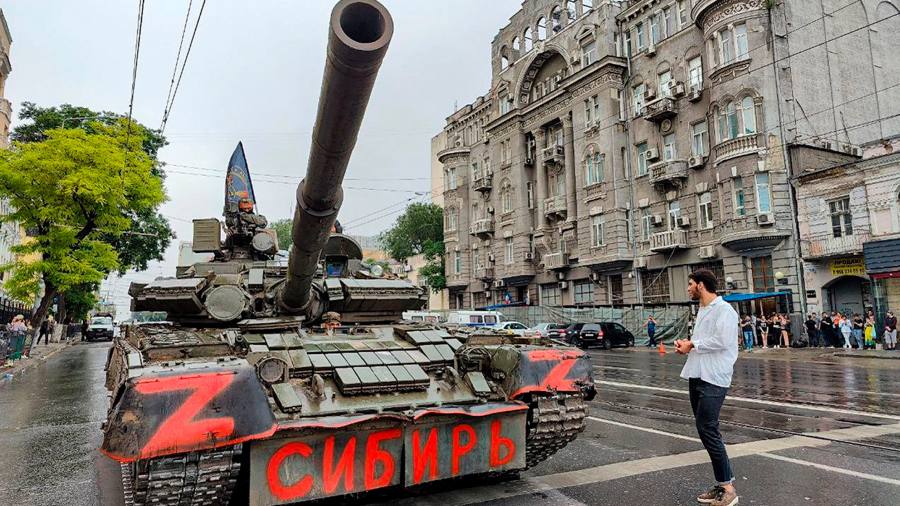Receive free Russian politics updates
We’ll send you a myFT Daily Digest email rounding up the latest Russian politics news every morning.
Russia has dropped charges against participants in the Wagner group’s failed insurrection and said the paramilitary force had agreed to hand over its weapons.
With the Kremlin moving towards reorganising its security forces in the wake of its deal with Wagner founder Yevgeny Prigozhin, the country’s national guard is now set to be armed with tanks and heavy weaponry.
The announcements on Tuesday came after President Vladimir Putin urged Wagner’s fighters — some of Russia’s most effective combatants — to join the army, stand down or leave the country.
Speaking to a group of soldiers and secret service agents in the Kremlin on Tuesday, Putin said the country’s security forces had “essentially stopped a civil war”.
He added that Wagner’s paramilitaries had been “completely financed” by the Russian state. He said the country paid Wagner Rbs86bn ($1bn) from May 2022 to May 2023.
Concord, Prigozhin’s catering company which Putin said owns Wagner, received a further Rbs80bn in army catering contracts, he said.
The Russian president held a minute of silence for pilots killed resisting Wagner’s advance on Moscow, saying they had “fulfilled their duty with honour.”
However, the FSB, Russia’s main security service, said it had closed its investigation into the weekend rebellion because the participants had “ceased the activities directly aimed at committing the crime”, according to state newswire Ria Novosti.
Dmitry Peskov, Putin’s spokesperson, said the Russian leader had decided not to prosecute Prigozhin over the country’s first coup attempt in three decades.
“There was a desire not to let the worst-case scenario happen,” Peskov said. “There were certain promises, the agreements are being realised.” Putin “always keeps his word”, he added.
While in the immediate aftermath of the failed insurrection the Kremlin had said the charges would be dropped, they had subsequently remained in force, in an apparent bid to put pressure on Wagner to abide by the deal.
The Russian defence ministry, whose leaders have been the main target of Prigozhin’s ire for months as Russia’s invasion of Ukraine continues to sputter, added that Wagner was preparing to hand over weaponry to the army.
“Preparations are ongoing for the transfer by Wagner PMC of heavy military equipment to active units of the Armed Forces of Russia,” the ministry said on Tuesday.
Wagner did not immediately confirm whether it would surrender its weapons.
Prigozhin claimed on Monday that Wagner was previously planning to hand over its equipment to the defence ministry — until Russia’s army hit one of the group’s bases in an air strike last week. The ministry said Prigozhin’s claims were groundless and no strike was carried out.
After attending Putin’s Kremlin speech on Tuesday, Viktor Zolotov, head of the national guard, said he had discussed giving his units heavy weaponry with the Russian president.
“We don’t have tanks and long-range heavy weaponry. We will integrate them into our units depending on financing,” Zolotov told reporters, according to Interfax.
Zolotov, formerly Putin’s personal bodyguard, said Russia had known of Prigozhin’s plans for the revolt in advance and accused western countries of colluding with the warlord.
Belarusian president Alexander Lukashenko, who helped broker the deal with Prigozhin, said he had put the Belarusian army on full alert on Saturday after the uprising began in southern Russia.
He also warned Belarus’s exiled opposition against trying to take advantage of the turmoil “to implement their scenario of an armed mutiny”.
In comments first reported by Belta, the country’s national news agency, Lukashenko said on Tuesday that he wanted to set the record straight about “the role played by Belarus in resolving the conflict”.
Read the full article here




